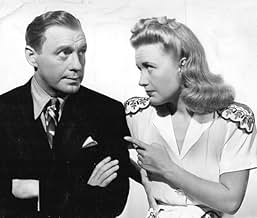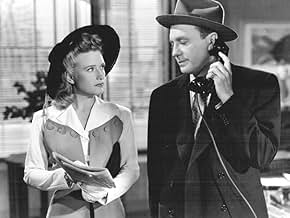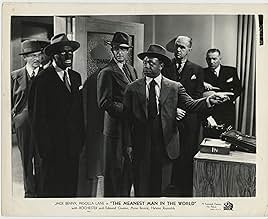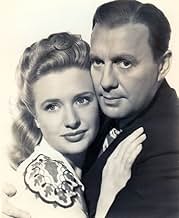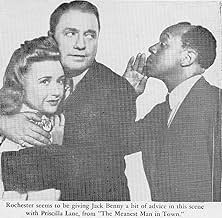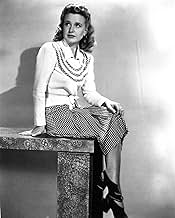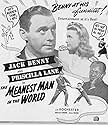A compassionate lawyer pretends to be heartless in order to boost his clientele, but it jeopardizes his romantic life.A compassionate lawyer pretends to be heartless in order to boost his clientele, but it jeopardizes his romantic life.A compassionate lawyer pretends to be heartless in order to boost his clientele, but it jeopardizes his romantic life.
Jackie Averill
- Boy with Lollipop
- (uncredited)
Conrad Binyon
- Boy
- (uncredited)
Morgan Brown
- Pedestrian
- (uncredited)
Paul E. Burns
- Farmer
- (uncredited)
Ralph Byrd
- Reporter
- (uncredited)
James Carlisle
- Client
- (uncredited)
Hobart Cavanaugh
- Mr. Throckmorton
- (uncredited)
Edward Clark
- Jury Member
- (uncredited)
Chester Clute
- Lawyer
- (uncredited)
Featured reviews
Jack Banney and Rochester (Eddie Anderson) really go to it in this comedy romance. The two toss barbs back and forth with ease that even outdid their frequent banter on Benny's radio show at the time. "The Meanest Man in Town" is a light comedy with a simple plot and not much of one. Benny's small-town lawyer can't make it as a lawyer at home, nor as an ambulance chaser in the Big Apple. The reason is because of his big heart. But, when circumstances happen that make him appear mean in the press, much changes.
And, from that point on, the film turns into screwball comedy. The ending is a real hoot. Edmund Gwenn has a small role, but it's one of the few in which he played the meany, or a villain or bad guy. But, because of the nature of this film, even Gwenn's nasty appearance is occasion for a chuckle.
Jack Benny was highly popular with his unique laid back humor, using long pauses with a sometimes dour and sometimes cynical persona. A Jack Benny program ran weekly on the radio from 1932 through 1948. Then he had a long-running TV series, "The Jack Benny Show," that ran from 1950 thru 1965. His movie making was sparse during the latter, but he had many appearances on other TV series and shows. Most of his two dozen films before that were box office hits.
And, from his first appearance in 1937, Eddie Anderson became a major part of Jack Benny's radio and then television shows. In the 1950s, Eddie was the highest paid African-American in radio and television. The two men were great entertainers, loved by audiences in the mid-20th century. They remained close friends until Benny's death in 1974.
The film may be far too slow for modern audiences, but those who like good old fun and comedy in films, should get a kick out of this movie.
And, from that point on, the film turns into screwball comedy. The ending is a real hoot. Edmund Gwenn has a small role, but it's one of the few in which he played the meany, or a villain or bad guy. But, because of the nature of this film, even Gwenn's nasty appearance is occasion for a chuckle.
Jack Benny was highly popular with his unique laid back humor, using long pauses with a sometimes dour and sometimes cynical persona. A Jack Benny program ran weekly on the radio from 1932 through 1948. Then he had a long-running TV series, "The Jack Benny Show," that ran from 1950 thru 1965. His movie making was sparse during the latter, but he had many appearances on other TV series and shows. Most of his two dozen films before that were box office hits.
And, from his first appearance in 1937, Eddie Anderson became a major part of Jack Benny's radio and then television shows. In the 1950s, Eddie was the highest paid African-American in radio and television. The two men were great entertainers, loved by audiences in the mid-20th century. They remained close friends until Benny's death in 1974.
The film may be far too slow for modern audiences, but those who like good old fun and comedy in films, should get a kick out of this movie.
As I stated, I love Jack Benny. One of those comedians who warms my heart just upon sight. Eve Arden (who would have been good in the Anne Revere part) is another example of that kind of persona whose mere presence makes me happy. Unlike the character he portrays in some movies and certainly on his TV shows, he was a very generous man with friends and strangers. No surprise there. He exudes that which makes his stinginess even more funny. This picture, with a lot of false starts and ending up nowhere, went off on the wrong track. Priscilla Lane was actually a nifty actress in so many of her films, almost surprisingly so. In addition, she is about as adorable as they come. (Benny often has some of the most appealing actresses to accompany him on his sprees.) Rochester, too, is a delight. Could have done without the black-face routine, but it was 1943 and awareness of this sort outrage was not yet in our craws. It did not go as far or as interestingly as it might have but what could have remedied it, I wouldn't know where to begin. "The Horn Blows at Midnight" is often claimed by Benny to be a failure and brought down his movie career. My impression is that it is more delightful than most of his forays into filmdom. Then of course he is in the utter classic "To Be or Not To Be". Nothing wrong with that one. And with him. And with Lane. It's just the film which isn't especially good. But so what? It has Jack Benny,
Jack Benny stars as Richard Clarke, a small town lawyer who moves to New York to seek success and discovers that he may not have what it takes—namely, he's just too kindhearted and sympathetic to attract any clients.
Eddie "Rochester" Anderson co-stars as Shufro, Benny's valet and right hand man; their relationship essentially duplicates that between Rochester and boss Benny on their radio program—that is, Rochester mainly follows orders but seldom hesitates to offer an opinion or suggestion.
The simple plot: Benny decides to try being meaner. Sure enough, when he steals a lollipop from a child and the event is captured by a newspaper photographer, the work starts flooding in. Success at last? Well, there are complications .
Priscilla Lane, charming and lively as Benny's fiancée, is understandably upset when she discovers that he's become a minor celebrity famed for unabashed meanness.
Edmund Gwenn is hilariously wicked in a small role as a client who needs help throwing an old lady out of her apartment. (It's his brother's widow.) Anne Revere is also good as Benny's bored secretary. (She hopefully shows him a trashy novel she's reading about a lawyer who makes passes at his secretary; instead of taking the hint, Benny asks to borrow the book when she's done with it.)
Unfortunately, the whole thing is only 57 minutes long, which doesn't allow much time for any of these fun supporting characters to shine. Oddly, the plot seems to build rather slowly—and then when things do start happening, the action is suddenly very fast paced, and then is just as suddenly over. (Apparently there were some editing issues behind the scenes.)
Definitely worth watching, though, especially for the great teamwork between Benny and Rochester—also for the hilarious series of newspaper headlines that chronicle Benny's adventures as the Meanest Man.
Eddie "Rochester" Anderson co-stars as Shufro, Benny's valet and right hand man; their relationship essentially duplicates that between Rochester and boss Benny on their radio program—that is, Rochester mainly follows orders but seldom hesitates to offer an opinion or suggestion.
The simple plot: Benny decides to try being meaner. Sure enough, when he steals a lollipop from a child and the event is captured by a newspaper photographer, the work starts flooding in. Success at last? Well, there are complications .
Priscilla Lane, charming and lively as Benny's fiancée, is understandably upset when she discovers that he's become a minor celebrity famed for unabashed meanness.
Edmund Gwenn is hilariously wicked in a small role as a client who needs help throwing an old lady out of her apartment. (It's his brother's widow.) Anne Revere is also good as Benny's bored secretary. (She hopefully shows him a trashy novel she's reading about a lawyer who makes passes at his secretary; instead of taking the hint, Benny asks to borrow the book when she's done with it.)
Unfortunately, the whole thing is only 57 minutes long, which doesn't allow much time for any of these fun supporting characters to shine. Oddly, the plot seems to build rather slowly—and then when things do start happening, the action is suddenly very fast paced, and then is just as suddenly over. (Apparently there were some editing issues behind the scenes.)
Definitely worth watching, though, especially for the great teamwork between Benny and Rochester—also for the hilarious series of newspaper headlines that chronicle Benny's adventures as the Meanest Man.
YouTube has this old chestnut. 'Meanest Man in the World'is a few minutes under an hour, and a good thing it is. The story is silly, yet Jack Benny, albeit wooden, remains the Jack Benny we know. And that isn't bad. And it's good to see Priscilla Lane as the love interest. She does a good turn when she's tipsy at a bar towards the end of the film. Then, there's Edmund Gwenn plays gleefully plays a meanie. And for once Anne Revere playing a secretary and not someone's suffering mother. But Rochester has star billing and the best quips. At a time when Blacks had walk on roles or a dance or song number as relief in a film, he plays the 'wise' Benny side kick who puts his finger in the eye of silliness, and manages to get Benny out of hot water of his own heat. An obvious boy gets girl film. And a pleasant hour of viewing, during the dark moments of the war against Nazi Germany and militaristic Imperial Japan.
... and this one is no exception.
In this amusing, if brief, comedy from 20th Century Fox and director Sidney Lanfield, Jack Benny stars as Richard Clarke, a smalltown attorney who moves to NYC in order to impress his prospective father-in-law. His girlfriend Janie (Priscilla Lane) can't wait to get married but she's unaware that Richard's law practice is going no where. It isn't until he starts acting cutthroat and mean that things start to become lucrative. Also featuring Eddie "Rochester" Anderson, Edmund Gwenn, Matt Briggs, Anne Revere, Margaret Seddon, Helene Reynolds, Ralph Byrd, Edward Gargan, Hobart Cavanaugh, Lyle Talbot, and Tor Johnson.
This seemed like a filmed version of a radio play, as almost all of the humor is verbal, and maybe that is to be expected as Benny was so big in radio at the time. That's a nice change of pace when slapstick seemed to rule the day in film comedy of the period. Benny and Anderson are a terrific team, naturally, and they play off each other like the seasoned pros they were. I also liked Anne Revere in an atypical role as Benny's bored, underpaid secretary.
In this amusing, if brief, comedy from 20th Century Fox and director Sidney Lanfield, Jack Benny stars as Richard Clarke, a smalltown attorney who moves to NYC in order to impress his prospective father-in-law. His girlfriend Janie (Priscilla Lane) can't wait to get married but she's unaware that Richard's law practice is going no where. It isn't until he starts acting cutthroat and mean that things start to become lucrative. Also featuring Eddie "Rochester" Anderson, Edmund Gwenn, Matt Briggs, Anne Revere, Margaret Seddon, Helene Reynolds, Ralph Byrd, Edward Gargan, Hobart Cavanaugh, Lyle Talbot, and Tor Johnson.
This seemed like a filmed version of a radio play, as almost all of the humor is verbal, and maybe that is to be expected as Benny was so big in radio at the time. That's a nice change of pace when slapstick seemed to rule the day in film comedy of the period. Benny and Anderson are a terrific team, naturally, and they play off each other like the seasoned pros they were. I also liked Anne Revere in an atypical role as Benny's bored, underpaid secretary.
Did you know
- TriviaIn March 1943, when the film was in wide release, a lawsuit brought by a group of lawyers from New Haven, Connecticut charged that this comedy "showed the legal profession in a disreputable light." The complainants asked for the movie to be withdrawn, but their plea was thrown out by Connecticut Superior Court Judge Patrick O'Sullivan.
- Crazy creditsEddie Anderson is credited as only "Rochester."
- ConnectionsVersion of The Meanest Man in the World (1923)
- SoundtracksI Wonder Who's Kissing Her Now?
(uncredited)
Music by Joseph E. Howard and Harold Orlob and lyrics by William M. Hough and Frank R. Adams
Details
- Release date
- Country of origin
- Languages
- Also known as
- Pior que uma Fera
- Filming locations
- Production company
- See more company credits at IMDbPro
- Runtime57 minutes
- Color
- Aspect ratio
- 1.37 : 1
Contribute to this page
Suggest an edit or add missing content

Top Gap
By what name was The Meanest Man in the World (1943) officially released in Canada in English?
Answer
